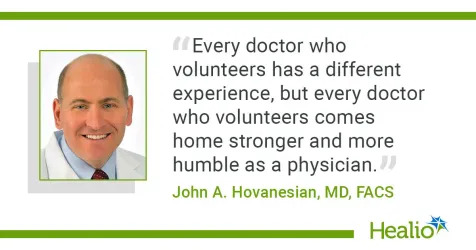By: John A. Hovanesian, MD, FACS
One of the strongest motivators for choosing a career in medicine is a sense of duty to help our fellow man.
Through our early medical training, many of us gain a special desire to help those in far-reaching places where medical care is less abundant.

As a relatively new doctor, it takes a bit of guts to find that first opportunity, travel far and have confidence you can make a difference. Since I was a second-year resident, I’ve made volunteer trips to Asia, Europe, Mexico and the Pacific Islands and can offer three points of advice to those early-career doctors who are considering their first trip.
1. Take the leap and do it early in your career. Most of us are less busy early on, and we have fewer family obligations. Although we have less time off, our employers are usually supportive of volunteer work because they know the professional fulfillment it brings. Starting early with volunteer work gives you a long runway to discover the best places and ways your volunteering can have an impact. For your own sanity, it helps to start in a place where people have been before. Even better is joining an organization that can simplify any temporary licensure or insurance you may need and offer you some support staff or at least equipment as well as advice about what types of disease you’ll find and what types of resources you should bring. I once took a trip to Fiji prepared to do dozens of pterygium procedures but discovered the biggest need was for reading glasses.
2. Be prepared for everything to be different. Operating in a foreign facility will test every bit of surgical flexibility you have. Electricity may be unreliable. Basic equipment may be absent or not working. Staff may be well intentioned but unhelpful. Language barriers can become frustrating for all very quickly. Regardless of your qualifications and the miracles you might offer, patients may be wary and unwilling to undergo treatment. Disease will appear very differently, and you’ll find technical challenges you never expected that test your confidence and cause you to question your judgment in making a trip at all. Those same challenges will teach you resilience as a practitioner.
3. Pick a destination and make repeated, sequential trips to the same place. You have your biggest impact through successive interventions, not just with patients but with the local medical community. Depending on the regulations of the country and its supply of doctors, the people you train need not necessarily be doctors. Many capable nurses or laymen can become the local eye specialist, treating infections, managing trauma and truly preventing blindness because of the expertise you have imparted. Try to leave behind locals who can follow up on patients, who can on a future trip learn to perform procedures, who can consult you by email or WhatsApp to allow your presence to be felt while you’re back at home. They can also inform you about supply and equipment needs, keep you connected to the country that you serve, and, best of all, help you have a parallel career that is entirely altruistic. Since my residency, I’ve made perhaps 25 trips to the country of Armenia in the former Soviet Union through the Armenian EyeCare Project. Next year will mark my 30th year volunteering with this group, and I consider my continuing efforts there to be the most important and fulfilling accomplishments of my life.
Every doctor who volunteers has a different experience, but every doctor who volunteers comes home stronger and more humble as a physician. Enjoy every interaction with the people you visit and the patients you treat as well as their family members. You are a treasure to each other.
Follow @DrHovanesian on X, formerly known as Twitter, and Instagram.




